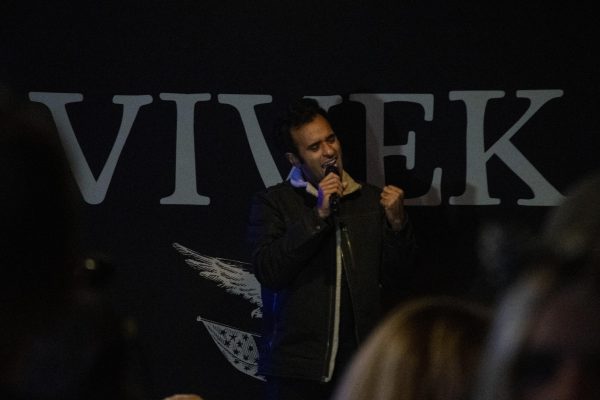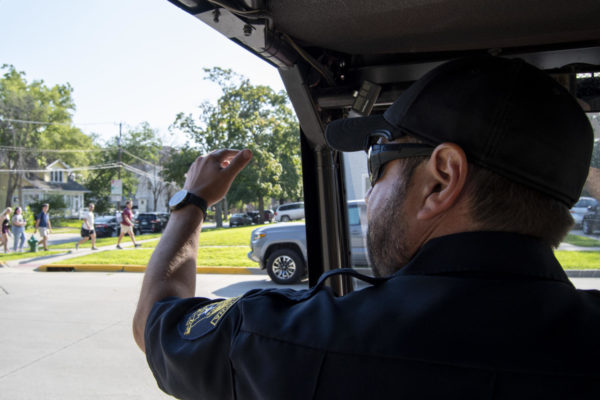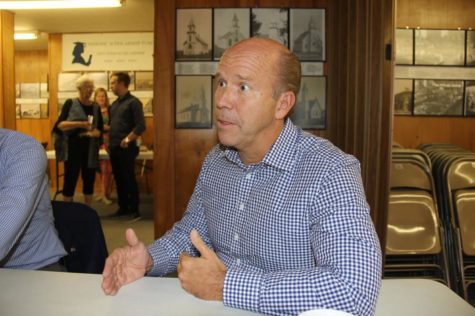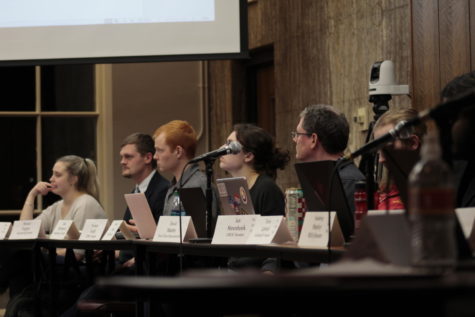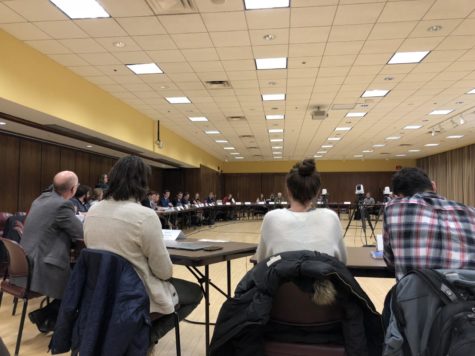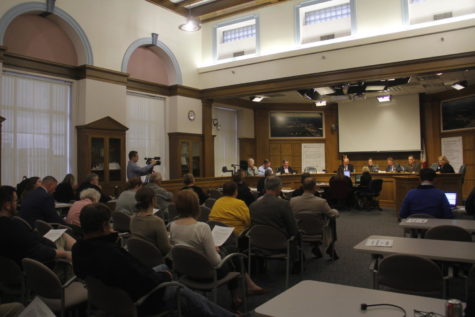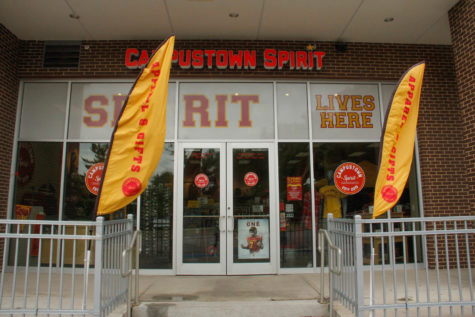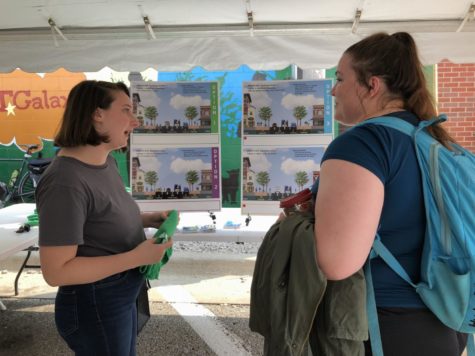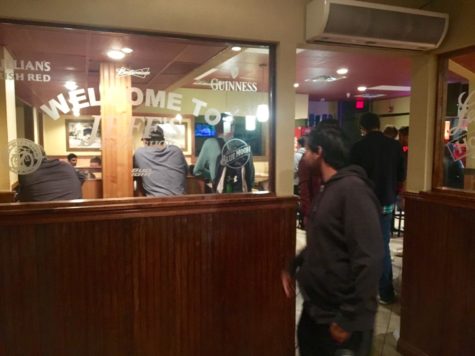Q&A with Roling, Dobbels
January 27, 2011
Q: To start off, I know GSB was talking about the Varsity Theatre last year, and [ISU President Gregory] Geoffroy shot it down, do you know the reasoning for that? Did LANE4 play a role in that?
Roling: President Geoffroy actually never said no to the project. The project was actually a “go” until last June. We had nearly finalized the leasing negotiations, so things were just all ready to go when we heard about LANE4. The university thought it would be a good idea and we, as leaders of the project, thought it would be a great idea to figure out exactly what was going to go on with Campustown before we invested $350,000 in a project … not knowing what the landscape of Campustown would be.
You know, it was very, very fortunate timing just because LANE4 talks began right before we were in the middle of our final steps of the theater. So we ended up only spending about $3,000 of the theater money, of the $350,000 that was allocated, so it couldn’t have been better timing. In short, it was a student decision to put things on hold. The university kind of agreed that it was a good idea to hold off on things and figure out what exactly would be in play. When we first talked about it, LANE4 was thinking about putting their own theater in, so we didn’t want to put our theater in if they were going to put their theater in. That’s just one example why.
Q: How much involvement has GSB had in the LANE4 discussion and the LANE4 project?
Roling: You know, recently, they’ve been formulating things on their own, but throughout the earliest stages of the process and then into fall, you know, the last couple of months are the only ones where they have been really filtering on their own and I guess they’re working on new things to bring forward.
They contacted us almost immediately in June, so we held a series of focus groups on general Campustown issues. GSB was one of several student groups … they talked with greek leaders, they talked with residence hall leaders, they brought in quite a few student focus groups over the summer months, so if you were around, [it was] a great opportunity to talk there. They also came back and talked with us in the fall, so we had the GSB meeting and then another thing in the M-Shop; those were our two biggest sessions.
Relating to the theater project, we probably had a dozen meetings either in person or over the phone to talk about that specific project.
All in all, I’ve been very pleased with the communication that LANE4 has given us. There have been no secrets about their processes. We just try to pass them on to students when we know anything. I’ve been pleased overall. We haven’t heard from them in the last month or so, but that’s natural. I’m thrilled that they’re doing their own work and don’t need to report to us every second of every day.
Q: What were some of the issues that GSB brought up during these meetings with LANE4? Were there any concerns that students had?
Roling: I think most of the concerns were based off of not being familiar with the project. People’s gut reaction is that “Oh my god, Campustown is going to be destroyed for two years and I’m not going to have anywhere to go and my favorite bars are going to be gone.” That was the initial gut reaction from a lot of people. LANE4 has made it pretty clear that they can’t afford to do that — just drive everyone out of the Campustown area — because they’ll never be able to bring them back. They realize that things currently in the area are the lifeblood. They will continue to be the driving force. That was one major concern.
Most of [the concerns] were related to specific small shops that people didn’t want to see disappear. Nothing’s known right now, at this point, on whether which things will stay and which things will go. I believe most everything will have the opportunity to stay.
Other than that, students spend most of the time asking more informational questions rather than voicing specific concerns.
Dobbels: The location of where things are going to be or what things are going to be there, which students had a very open opinion and were able to give their opinion to LANE4 through those forums, through coming to the GSB forum. LANE4 was very open to taking suggestions from us students. When they started the project, they came here and set up specific groups for all the locations. They came to the student leaders, they came to Campustown, they came to all these locations to gather information, to ask us what we wanted in the location and took all that information back. So they were very open and very willing to cooperate and hear out the students as well as the administration on what we want to see in Campustown from a student’s perspective and from the administrative side of it. But then they took it back to Campustown, so those concerns were addressed.
Roling: One other concern that was brought up was that we’re going lose the student focus in Campustown and a lot of people are afraid it’s going to become too community friendly, if you will. That Campustown isn’t a place for children. But what [LANE4 has] have expressed as their interest in doing it is making Campustown a much more friendly 24-hour area. To be honest, no one of non-student age is really going to want to be around anyway during the hours of midnight to five, so they’re going to maintain that special student focus as well as bringing in new activities that appeal to broader audiences. It really is going to reach more audiences without cutting back on what students enjoy.
The under-21 crowd again expressed concern about more, I wouldn’t say concerns, but they expressed their interest in making sure that their needs are met as well. That’s something that’s very important to the university, our government student body and then LANE4 as well.
Q: GSB conducted a survey, I believe at the end of the fall semester, right? What was the purpose of the survey and how much student feedback did you get? Is LANE4 going to use that at all?
Roling: No [LANE4 is not going to use the results] … GSB conducts surveys each semester, so we try to throw out some general GSB questions — how do you best hear about GSB and general functions — hit on our hot button issues. So we thought it would be a great opportunity to ask Campustown questions. I haven’t been able to dive into the specific comments about Campustown because we didn’t get the results back until this semester, but much of the feedback remains kind of what’s been conducive with what we’ve heard so far. Students are excited about the new prospects of Campustown, while still wanting to maintain the student focus without losing a lot of their favorite things, things that drive them to Campustown.
Q: Will GSB continue to have more involvement with LANE4 in the future?
Roling: I firmly believe that we will. LANE4 is in this as a business, you know, this is what they do for a living. It’s what people do to make a living. They would be foolish not to continue to engage students and they recognize that. They realize that their primary target audience is the 28,000 people across the street and they need to do what they can to engage students. I would imagine they are going to be doing quite a bit, continuing to talk with our government of the student body. They’ve expressed willingness to come back to our meetings some time this spring semester.
I have to imagine they’ll continue to engage student governments in the greek area, as well as our Campustown association.
They’ve done a very good job of identifying the key student groups. They’ve really been receptive to all students. Students have e-mailed them and gotten responses very quickly. All feedback is appreciated, so whether you come to us with concerns and they’re voiced or whether you go straight to LANE4, I’m sure they appreciate the feedback.
Dobbels: That’s the big thing-students have the right and deserve the right to present their thoughts and ideas and I know that LANE4, as well as GSB, is open to hear those thoughts. So when things do continue to move forward, GSB can have that involvement because we have the thoughts and information from students on what they’d like to see to move forward with the project.
Q: What kind of implications does the renovation have on students? I know there have been concerns with if they have apartments there, will the rent go up or, you touched on it earlier, the businesses that they frequent to might not be there anymore?
Roling: They’ve said that they’re planning on charging fair market value for the property. Property value will go up because they are going to make the buildings nicer — you get what you pay for. As far as student properties go, that question, I believe, was raised to LANE4 once and they said it’s a college town. There’s a lot of cheap housing all over the place. In order to remain competitive, I can’t believe that those properties would become any more expensive than they already are. Since there are so many good places to live in Ames at reasonable rates, I can’t imagine that that will hurt the students too much.
Students may be inconvenienced during the renovation, just by having construction equipment all over the place, I really shouldn’t say all over the place, but one building at a time. You might have to detour a sidewalk or something, but that should really be the extent of it. Not every bar is going to be closed down during this; actually very few will be closed down. Student life will remain pretty much unchanged. Everything’s being built constantly on campus, it’s just going to be like moving one of those construction projects across campus.
Dobbels: I think the same thing kind of goes for the businesses, too. Businesses come and go all the time, no matter what happens. So saying that a business is leaving because of LANE4 or construction of LANE4 coming in, to me, it just doesn’t work in my mind because we get new businesses all the time. Businesses move, businesses leave … and that’s just kind of how life works in general. So anything like that, to me, it’s just people if they see a better opportunity somewhere else, then they’re going to go somewhere else, and that’s just, to me, how it’s going to work.
Q: What kind of businesses do you think would be beneficial to both students and the university as a whole?
Roling: You know, that’s what they’ve been gathering. You know, I have my opinions, [Dobbels] has his opinions. For students, the need is definitely there for some under 21 entertainment of some form. I don’t know what that form is, I know what I would like to see, but that’s my personal view. I’m not one who spends a lot of time in the Campustown area to begin with.
You know, a lot of people have their own ideas. The under 21 entertainment’s a good category. Sit-down dining is another one that is commonly brought up. LANE4 has mentioned that they want to, in the big scheme of things, bring in potentially one, maybe two, anchors or maybe like one big restaurant chain anchor to support everything. They’re talking about a hotel in the area that could be an anchor to help bring people to the area. A grocery store, a drug store is other things they are talking about and seem really excited about the prospect for. As a student who lived on the west side of campus, I needed that more often than I had the time to take the bus across town.
Dobbels: I think all of those extensions are beneficial to the students in the area as well as the university as a whole just to rejuvenate the area.
Q: Anything else you guys would like to add?
Roling: Not really, I mean, I wish I were freshman and not seniors so [we] could stick around and see some of these developments. You know, [Campustown] remains a very, very, very valuable potential recruiting tool for Iowa State. It’s the gateway to that side of campus. That’s one of the first places you drive when you come on a campus tour. You drive by on your way to Enrollment Services Center. You meet by the Campustown area and we can really use that as one of the key gateways to our university that has huge future implications for future students.
Dobbels: I think it’s important for students, too, to realize that we’re open for feedback. We’re always open to answer questions and to give more information to students. We’re here as a resource because we’ve been through this entire process from the very beginning in being a part of GSB. So it’s important for students to know that if they do have concerns, if they do have thoughts, if they have ideas, positive things, or whatever they have, to bring those things forward to us so that we can discuss them … if they do have things that they want to talk about, we’re always open to talk about them and make sure that LANE4 hears the concerns of the students and the ideas of the students as well.






